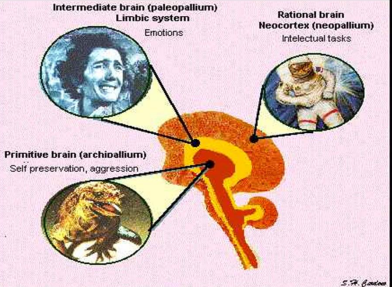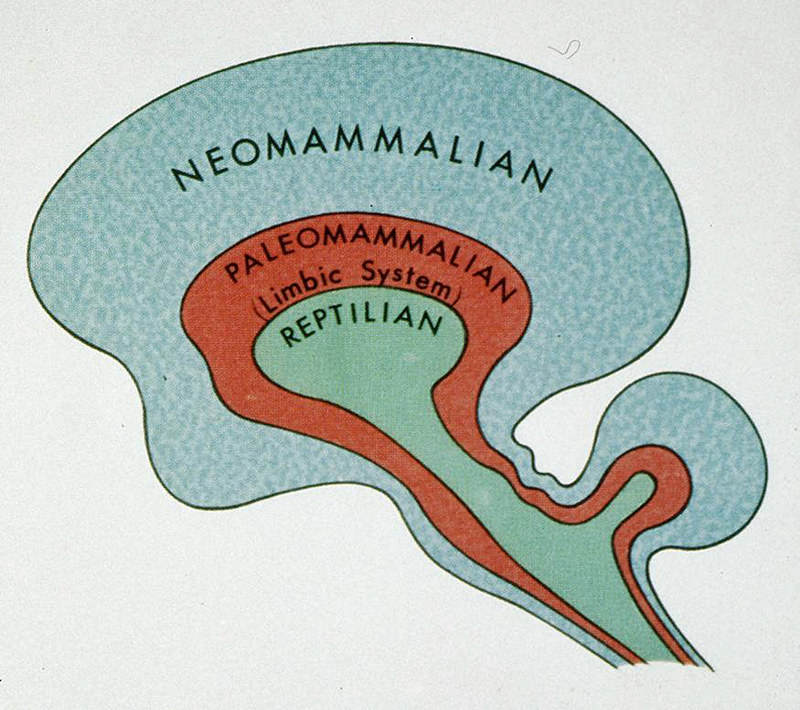Please Stop Referring to Your Non-Existent “Lizard Brain”
I recently had a video come up in my YouTube feed where a fairly respected university professor spent about 15 minutes talking about the “reptile brain” and I got a little irritated. The term “reptile brain” or “lizard brain” has been a part of pop-sci consciousness for decades, and is part of a theory that is largely wrong. Here’s a short explanation of where the term comes from, and why we shouldn’t use it.
Where Does the “Lizard Brain” Concept Come From?
The idea of a reptilian brain comes from the Triune Brain theory, which was developed in the 60’s by neuroscientist Paul MacLean. In this theory, higher functioning portions of the brain emerged as layers that were added on top of more primitive layers over time, something like geographic strata. First there was the “proto-reptilian” layer (now known as the basal ganglia), which was believed to be the seat of instinctual and basic behaviors like territory, fight or flight, and motor control. Wrapped around that then was the “paleo-mammalian” complex (now called the limbic system) from which emotions were based, and presumed important for social animals. Last came the “neo-mammalian” cortex, which is essentially our neocortex and it was attributed to most all higher functions.

In addition to the concept that these layers of the brain developed in evolutionary stages which led to higher functioning, MacLean argued that, “the three brains operate like three interconnected biological computers, each with its own special intelligence, its own subjectivity, its own sense of time and space and its own memory.” This theory is the primary basis for people often using the term “lizard brain” when referring to fear responses, emotional dysregulation, or self-discipline.
Why Do I Care?
I care because this theory is wrong, and we should strive to not propagate falsehoods. Humans did not evolve from reptiles, so at even a very basic level doesn’t even make sense to say that a part of the human brain is reptilian. More importantly, the brain does not operate in three systems, and while the structure of the brain does matter in terms of performance, the proposed layers of the Triune Model are genetically encoded into just about every animal in the Chordata phylum, meaning that the mammal/lizard/human distinction is pretty pointless. While MacLean’s model jives well with ancient Greek and Freudian pseudoscience, and is also easy to explain, it fundamentally misrepresents brain evolution and promotes reductionist, incorrect lines of thinking about human behavior and cognition.
I care because while inaccurate models like this may seem harmless in passing, when particularly persistent ones like the Triune Model leak their way into fields like the psychology of childhood development and legal defense, this misinformation could produce very real and negative consequences.
I care because the model promotes ancient anthropocentric ideas wherein all evolutionary developments point from fish to lizards to the zenith that is human intellect, and strips other animals like lizards of their status as emotionally and socially complex animals, even if much of that communication is not outwardly visible, as is common with birds and mammals. Labeling animals as “lower” and stripping their capacity for complex behaviors and rituals usually serves as grounds for mistreating them.
In Short
You do not have a “lizard brain”, so please stop making references to it.
I had planned to do a longer writeup on this, but it turns out that I am quite far from the first person to have had this thought. If you felt that my explanation as to why the Triune Model is demonstrably false was somehow lacking and would like to study this topic in more detail, here is a list of much more in depth pieces on MacLean’s Triune Model, the idea of a “lizard brain” and why it has been largely debunked. My favorite quick breakdown would be the Lisa Feldman Barrett video, and for something with a little bit more meat to it I would read the paper linked last at the bottom.
More Reading on the Triune Brain Myth
- A theory abandoned but still compelling
- Mouad Qarchli – The enthralling tale of the lizard within
- New Generation Neuroscientists Asserts that the Brain Isn’t Triune But Adaptive
- No, You Don’t Have a “Reptilian Brain”
- Reptilian Brain Myth Is Still Alive and Kicking
- Revisiting the Triune Brain, with Stuart and Susan
- That Is Not How Your Brain Works
- The Brain Is Adaptive Not Triune: How the Brain Responds to Threat, Challenge, and Change
- The brain myth that won’t die | Lisa Feldman Barrett
- The myth of the reptilian human brain is tenacious – but wrong
- Triune Brain: Myth or Fact
- Triune brain
- Triune Brain Myth
- Unlearning the Triune (3-part) Model of the Brain – It’s a Myth?!
- What Carl Sagan got very wrong about the human brain
- What Is the Triune Mind?
- You Don’t Actually Have A ‘Lizard Brain’, Evolutionary Study Reveals
- You Have One Brain (Not Three)
- Your Brain Is Not an Onion With a Tiny Reptile Inside
Anyways, what started as mild irritation at being subjected to misinformation by an algorithm recommendation ramped up into modest amount of research and a better personal understanding of a piece of neuropsychology’s history. I hope that you learned something from my article (or at least will are curious about the topic now), and will refrain from promulgating 60 year-old, debunked neuroscientific theories. If not for the sake of truth and respect for scientific research, then at the very least to keep from triggering my fight reflex and setting off my lizard brain.
Thanks for reading,
-WellTree
